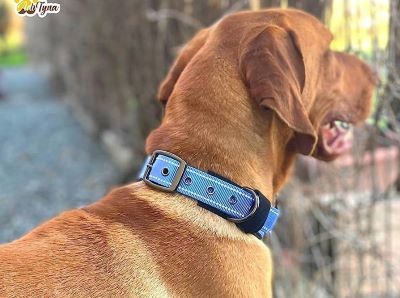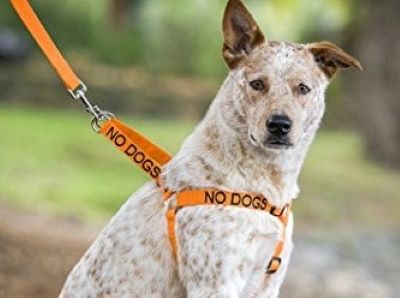Have you ever wondered what if people came with labels like “grumpy”, “happy”, “choosy” or “avoid me”, this way you could simply avoid interacting with them or approach them with more enthusiasm.
Well, we don’t know about humans but dogs surely appear with some manual guide on their neck in the form of leads! There is a whole range of fashion you probably don’t know about.

So let’s understand What do different color dog leads mean? What do all the color leads suggest and how should we approach such dogs?
What Do Different Color Dog Leads Mean?
There are many colors, styles, and materials available for dog leads. The color of the dog leads conveys an important message about dogs to other dogs, people passing by, and other dog owners. Let’s understand what these colors suggest:
1. Red Dog Lead
Red color mostly indicates some warning, the same way red dog lead suggests that that dog is not friendly, or has behavior issues, and requires the same from strangers. If you ever locate a dog with red color lead then always prefer to keep your distance and talk with the owner, before interacting with a dog.

2. Green Dog Lead
Green dog lead generally means that a dog is friendly or comfortable around strangers. It indicates that you can approach the dog for petting and socialization. However, always ask the owner first and approach the dog politely.
3. Yellow Dog Lead
Just like us humans dogs too feel nervous. Dogs with yellow lead require extra space and should not be approached directly as they might be fearful, nervous, or recovering from illness. So, yellow dog lead works as a ‘caution sign’ to maintain boundaries and respect the dog’s space.
4. Blue Dog Lead
Dogs in blue color lead are typically service dogs. They provide assistance to immobile people, or with medical conditions. Do not disturb these dogs as they might be working and not playing around finding treats.

5. Orange Dog Lead
Orange color leads are mainly for other dogs than they are for other humans. Such lead suggests that this particular dog is under training so it might be good to keep your dog away. They may be good around children or adults, but they need to be restricted around other dogs in order to prevent any friction.
6. White Dog Lead
White dog lead suggests that this dog is blind or deaf, or it has limited ability to hear or see. Around such dogs, we should be more affectionate and careful, and always talk with the owner first to approach dogs in the right way.
7. Patterned or Multi-Color Dog Lead
Dog leads with different patterns or multi-colors are mainly for aesthetic purposes only. Dogs might like to wear them if they are fun and stylish. Dogs are like, ‘Why should humans have all the fun with colors!’

To learn more about properly using leads for dog training, check out how to use a training lead.
Are There Any Other Types of Dog Leads?
Yes, there are some other types of dog leads available. If you feel unsure then your vet can also help you decide. A few of the most common dog leads include:
- Flat collar lead
- Head halter
- Martingale collar or choke collar
- Flea/tick collar
- Vibrating collar
- GPS collar
- Elizabethan collar
“Choose a collar or lead which is comfortable for your dog. A high-quality material leads in order to avoid skin problems for your dog. Use them for short periods and never pull so much that it harms your dog or makes him more aggressive,” suggests Dr. Vanesa Farmer from WebMD.

Always remember to use positive reinforcement techniques as they may bring more positive changes in your dog’s behavior.
The Benefit of Dog Leads
Dog leads during a walk should not be all about keeping them on ‘track’, A walk should allow your dog the freedom not only to relieve himself but also to engage in some sniffing and exploration[1]. Not all dogs tolerate a strange dog at close range, dog leads help to prevent any fighting. Here are some more benefits:
- Better control of your dog when walking in a crowded area.
- Easy to use, take on and off on the go!
- Good for communication and subtle control

- Varieties available as per breed and preference
- Keeps dog safe and stops from running away
Always remember to use positive reinforcement techniques as they may bring more positive changes in your dog’s behavior. Having the best retractable dog lead can also give your dog more freedom while maintaining control
FAQs
What Color Collar Should I Get My Dog?
Warm vs Cool Tones: If your dog has a warm-toned coat, a collar in a warm color like red, orange, or yellow could look good. On the other hand, if your dog has a cool-toned coat, a collar in a cool color like blue, green, or purple might be a good match.
What Is the Difference Between Collar and Slip Lead?
A slip lead is a collar and a leash all in one. A slip lead has a loop at the end of it, which acts as the collar. The loop at the end means the collar will tighten indefinitely if pulled, which is why many pet parents opt against using them.
What Color Collar Is Best for Dogs?
If your pup is a “warm” tone – think light brown, tan, honey, and apricot – a cool-colored collar and leash in silver, lime, or cobalt will really stand out. Conversely, grey, black, and dark brown fur contrasts best with warm colors; try red, orange, or purple gear.
Is a Slip Lead Better Than a Flat Collar?
If used correctly, it is very effective. If you decide not to use a slip lead for training your dog, there are other options. There is, of course, the regular flat collar and clip-on lead. These are cheap and easy but can still pressure your dog’s neck if the dog pulls hard or consistently against the lead.
What Do the Different Colored Collars Mean?
Blue-collar jobs are those that involve a greater degree of physically taxing or manual labor. Blue-collar jobs include farmers, mechanics, power plant operators, and electricians. White-collar jobs, on the other hand, typically work in office settings in clerical, administrative, and management roles.
Do Slip Leads Damage Dogs?
Slip leashes cause pain when used incorrectly. Slip leads sit on a highly sensitive area – a dog’s neck. In this area, dogs have a lot of nerve endings that can be pinched, so when they pull into the slip leash it will hurt their throat, cause nerve damage, rope burns, and a lot of pain.
Summary
So, to answer, what do different color dog leads mean? then all these colors are not just for fun. Each color indicates about dog’s situation, behavior, and special needs.
If you come across any cute dog along your way and you feel like having some furry cuddles then try to understand the significance of colors and approach the owner first, to avoid any discomfort to the dog.
If you’re interested in giving your dog more freedom during walks while maintaining control, a retractable dog lead is a great option. Learn more by reading How a Retractable Dog Lead Works.
Have safe furry cuddles!
Reference:
- Cpdt-Ka, V. S. (2022). Tips for leash training your dog- PetMD.



